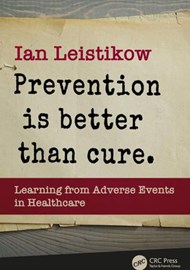Ian Leistikow has an impressive CV; as Senior Inspector at the Dutch Healthcare Inspectorate and a member of the Strategic Advisory Board of the International Forum on Quality and Safety in Healthcare, it is clear he is passionate about advancing patient safety.
Leistikow believes that improvements in systems have resulted in human behaviour being the major cause of adverse incidents in healthcare, stating that “in most cases the mistakes people make would be made by others too, given similar circumstances”, and has therefore compiled this book of case studies highlighting the advice he would have liked during his career as a practising clinician.
Each chapter begins with a clinical scenario, based on real life, in which mistakes have been made. The author goes on to reflect on behavioural changes that could be employed to avoid such errors occurring again. Some of the scenarios feel a little contrived, and a lot of the recommendations are simply common sense, however the chapters on handover and underperformance are particularly thought-provoking, and Leistikow’s expertise is abundantly apparent by his use of a strong evidence base and thorough knowledge of healthcare processes from around the world. It is inevitable that a book on medical errors uses examples from the airline industry, however Leistikow’s comparisons are fresh and apt, and I especially liked his adaptation of the ‘Nine Red Flags’ system to alert clinicians of a heightened risk of adverse incidents.
Whilst this book is not as engaging as the much-heralded Black Box Thinking by Matthew Syed (and its brevity prevents it delving into as much detail on the human psyche), it is a quick and reasonably-priced read containing some easily applicable suggestions. I would recommend it for trainees preparing for interviews, or as a useful addition to your department’s bookshelf.





